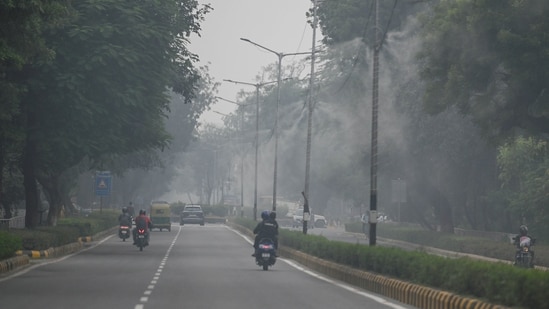970x125
Delhi woke up to a hazy morning on Thursday, with the Air Quality Index of Delhi recorded at 366 as of 10 am, according to data by the Central Pollution Control Board. Major areas in the city saw ‘very poor’ air quality.
970x125
The overall 24-hour average AQI stood at 279 on Wednesday, 4 pm, as compared to 294 on Tuesday. These readings come despite of the cloud seeding trials conducted in the national capital.
On Monday, the AQI was 301, falling under the “very poor” category. Despite the improving overall air quality, the next few days will see the air quality fluctuate between the “poor” and “very poor” categories.
Here is the AQI of major areas in Delhi at 9 am, according to the data by CPCB
Post-Diwali celebrations, the city has been experiencing ‘poor’ and ‘very poor’ categories in several areas, even as Stage 2 of the Graded Response Action Plan (GRAP) remains in effect. Truck-mounted water sprinklers have been deployed across the city to combat air pollution.
AQI remains poor despite cloud seeding trials
Delhi’s AQI has remained in the ‘poor’ category despite several cloud seeding trials by the government, as a part of its air quality management strategy.
Earlier, two cloud seeding attempts were carried out on Tuesday by the Delhi government in collaboration with IIT Kanpur, which did not produce favourable results as the moisture content predicted by IMD was low, at around 10-15 per cent, which is not ideal for cloud seeding.
The cloud seeding attempt for Wednesday was postponed due to a lack of enough moisture in the clouds. In an official statement, IIT Kanpur said that the process is highly dependent on the right atmospheric conditions. The institute also said that while favourable results were not produced, cloud seeding led to a measurable reduction of major pollutants such as PM2.5 and PM10.
NDMC double parking charges
Meanwhile, the New Delhi Municipal Council (NDMC) on Wednesday announced doubling of parking fees across the national capital after the Graded Response Action Plan (GRAP) Stage-II was invoked due to deteriorating air quality.
The move aimed at discouraging the users of private vehicles due to increased double parking charges for off-road and indoor parking areas managed by the NDMC.
Also read: Panchkula’s air turns worst in country
Further, the CAQM has prohibited the entry of commercial goods vehicles registered outside the national capital that remain non-compliant with BS-VI emission standards from November 1. As per the notification, non-BS VI-compliant commercial goods vehicles are allowed to enter the city until October 31, 2026.
970x125

